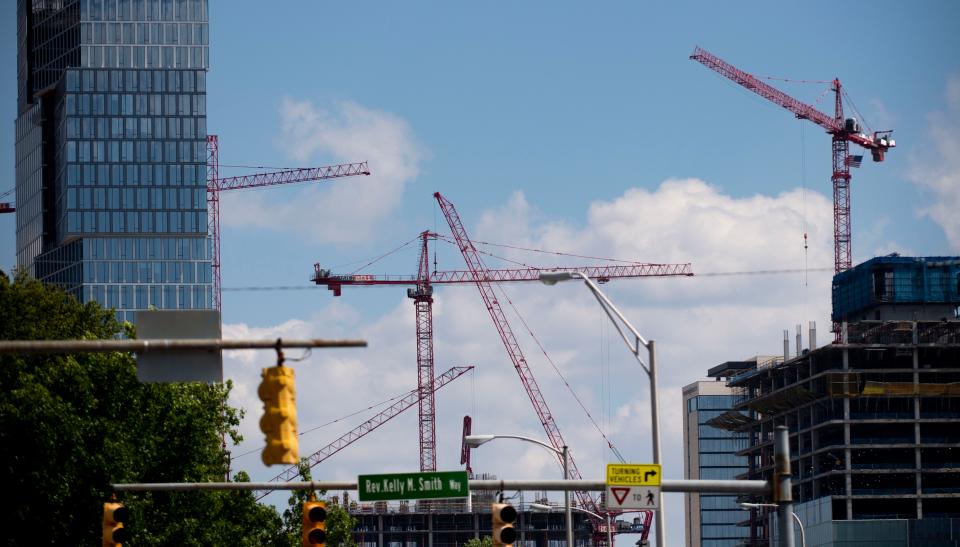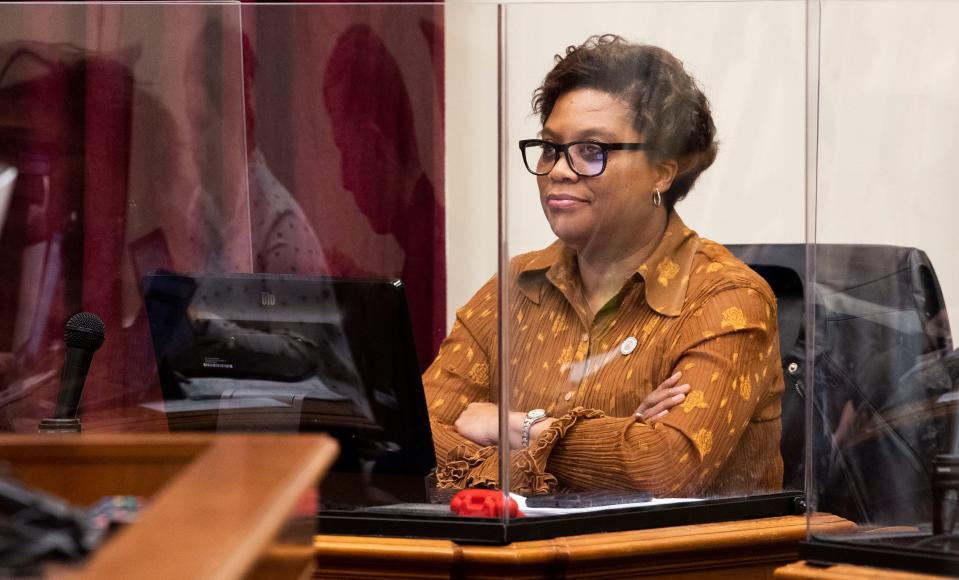Nashville zoning bill led to chaos. Can we fix this? 'People came angry and left angrier'
By multiple accounts, a public meeting last Saturday about proposed zoning changes to build duplexes, triplexes and quadruplexes in Nashville’s urban areas designated for single-family homes devolved into chaos.
Some members of the crowd at a rented Belmont University classroom booed and jeered At-Large Council Member Quin Evans Segall who sought to explain what her legislation would do.
Neighbors posted their frustrations on the NextDoor neighborhoods social media app, saying they felt misled, confused and irritated.
X, formerly Twitter, was filled with commentary and controversy for days including one thread I created that earned me my share of criticism. I was not at the meeting, but now I wish I were.
Former Council Member Emily Evans responded on Wednesday to my post, writing: “I believe I would be known as someone that does not shrink from tough topics so with some credibility I would say it was one of the worst community meetings I have attended. People came angry and left angrier.”
Nashville needs more affordable housing, but how do we get there?
I have covered housing issues for years and have documented the growing affordability crisis that is keeping more and more people from attaining home ownership.
Nashville, with more than 700,000 residents, has boomed and is Tennessee’s largest city, but 44% of residents make less than $39,000 a year and skyrocketing rents have priced out middle-class residents pushing them further away from the heart of the city.

Rising home prices, high interest rates and demand from higher-income residents, especially newcomers, have further complicated matters.
On Feb. 28, the Imagine Nashville community engagement initiative released its findings from surveying 10,000 residents in 100 days showing: “72% of Nashvillians see ‘a growing divide between rich and poor’ and 72% believe ‘leaders in Nashville are investing too much money in the wrong things’ rather than “the people that live here’.”
Related: Nashville needs affordable housing. But changing zoning law starts with listening to NIMBYs.
We need more affordable housing in Nashville, but the March 2 public meeting exposed that our community still grapples with where to put it.
This is not unique to Nashville, and when neighbors feel real or perceived threats to what they consider the character of their neighborhoods, their quality of life or their pocketbooks, time and time again, they push back.
Evans Segall ran on a platform to reform the zoning code
The multiple pieces of legislation are called Nashville’s Essential Structures for Togetherness (NEST) and aim to update Nashville-Davidson County’s zoning code to create different types of homes often called “middle housing” to create more affordable options for prospective homeowners.
Evans Segall, a first time councilor elected in 2023, came in with an aggressive agenda to tackle the city’s affordable housing crisis.
“We must update our code and zoning process to make it easier to build our environment in the ways today’s Nashvillians need and want,” she wrote in response to The Tennessean’s candidate questionnaire in 2023.
I believe she is sincere in her dedication to this issue, but she misread the politics.

Zoning reform bills were first introduced in February to mixed reaction
The Metro Council has 40 members – 35 represent individual districts and the five At-Large members represent the entire county.
District members typically have their ears closest to the ground on hyperlocal issues, but they work with At-Large members on legislation that impacts the entire community.
Evans Segall collaborated with District 20 Council Member Rollin Horton, who represents The Nations and parts of West Nashville, on various pieces of NEST legislation, and other council members co-sponsored the measures.

But the two most controversial bills – BL-185 on duplex provisions and BL-186 on residential scale multifamily home – were steered by Evans Segall.
She presented them for a first of three readings in the Metro Council’s Feb. 6 meeting, but asked to defer them to April 2 in highly contested and one tied votes that nearly killed the bills.
Controversial legislation is dead for now
On Wednesday, Evans Segall agreed to put BL-185 and BL-186 on hold until an infrastructure study is completed in 2025.
In a news release, she thanked District 3 Council Member Jennifer Gamble for her support and added: “We must persist in making sure that all voices are heard so we guarantee comprehensive, equitable and just representation on housing issues.”

Gamble, who represents the area including Bellshire, Brick Church Pike and a portion of Madison, chairs the Metro Council Planning Commission and was a critic of her colleague’s legislation.
In her February newsletter to constituents, she shared her comments on the bills:
“BL2024-185 and 186 are a nuclear approach to an issue that requires comprehensive and strategic planning. These bills were not developed with public input or in consultation with the Metro Planning Department or Affordable Housing Taskforce nor was there any consideration for how the proposed zoning reforms will impact Black and Brown communities.”
Gamble, who is in her second term in office, emphasized the point that a Council Member should not bring up a proposal for a vote among the elected body until there is thorough vetting and multiple opportunities for public input in community meetings.
Evans Segall’s conciliatory words toward Gamble demonstrated how important – and sometimes how slow – building consensus is in getting a majority of Council votes.
West Meade representatives promises a fight
However, this misstep galvanized opponents.
On Thursday, District 23 Council Member Thom Druffel sent an email to constituents with the subject line: “Our fight against proposed zoning changes | An Update.” His district includes West Meade, and Belle Meade is within his district though it is its own satellite city (a point of clarity per a reader's keen observation).

“We must recognize that (Council Member Evans) Segall is just delaying the proposed legislation … We are fighting this effort to change the fabric of our neighborhoods. We need your voice,” he wrote.
Evans Segall should take this as an opportunity to seek common ground with Druffel. A bad outcome is for nothing to happen that further addresses the affordable housing crisis.
A better outcome would be that innovative solutions emerge with urgency to take a more measured and less “nuclear” approach and involve public input and answering neighbors’ questions.
A positive outcome for Mayor Freddie O’Connell, who is not involved in this legislation, is that the public’s attention will not have to compete with the transit referendum he proposes to hold on Nov. 5.
Divisive legislation during an already polarized election year could create a major distraction.
Addendum: On March 8, I attended a NEST community meeting at the Edmondson Pike Branch of the Nashville Public LIbrary led by Evans Segall and District 4 Council Member Mike Cortese. Among the concerns residents expressed: threats to property rights, property values and tax bills. In addition, some questioned how the proposals would spur the construction of affordable housing versus developers building more market-rate homes to maximize their profits. More to come.
David Plazas is the director of opinion and engagement for the USA TODAY Network Tennessee. He is an editorial board member of The Tennessean. He hosts the Tennessee Voices videocast and curates the Tennessee Voices and Latino Tennessee Voices newsletters. Call him at (615) 259-8063, email him at [email protected] or tweet to him at @davidplazas.
This article originally appeared on Nashville Tennessean: Nashville housing: Zoning bill had the right idea, but wrong approach